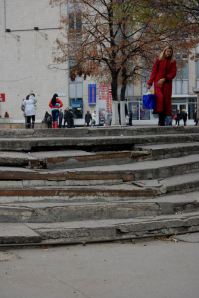
Does Moldova make you sadder? Does just being here cause one’s happiness index to plummet beyond rescue? Bruce Hood would answer in the affirmative. I am listening to his book The Self Illusion as I walk to and from work each day and it is giving me a somewhat undesirable perspective on how I may be chipping away at what I had previously thought to be my natural state of joy.
In line with Hume’s “bundle theory,” Hood states that decades of neurological research lends proof to the theory that the “me” inside my head is an ongoing, illusory narrative concocted by the brain to establish a necessary focal point for the reception and organization of stimuli into coherent patterns for reciprocal behavior. He describes an elegant metaphor of the “self” as the external mirroring of one’s cumulative inner experience of the world and the other “selves” we encounter, giving an oddly somatic testimony to the notion that ‘we are all one.’ To the degree that we have an impact on the people who are in direct relationship with us, or who benefit from our work, or buy our products, or listen to our songs, or live in our buildings, or abide by our laws, or respond to our ads, or slip on our tossed banana peel – etc., etc., etc., – then we are affecting and thereby shaping the formulation of other “selves” in our world, contributing to the reflection that we receive from them that thereby shapes us in turn. Whew. (Of course, reading the book will give you a much deeper appreciation of his argument.)
“The line between out there and in here is not as sharply defined as we think.” Eric Weiner in The Geography of Bliss
So what does this have to do with me and Moldova? Well, here’s the thing. A Dutch professor named Ruut Veenhoven , along with his colleagues at the World Database of Happiness (WDH,) has been collecting data for years on what makes us happy, what does not, and – interestingly – which nations are the happiest. Not surprisingly, Moldova consistently scores near the very bottom of the index. Lower, even, then some African countries that definitely have a lot more reasons to bitch.
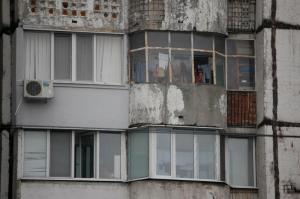
In the Geography of Bliss, a book about his travels through some of the happiest countries in the WDH and one – Moldova – that decidedly is not, Weiner proffers a theory that Moldovans are more unhappy because they are in Europe’s backyard and inevitably compare themselves with countries like France, Italy, and Germany, where so many of their working adults flee to make money. However, there is also the on-going legacy of the Soviet system, which has warped the very fabric of the nation. And there is also the physicality of Moldova – the crumbling building, the frost eroded concrete, the rusting pipes, the ubiquitous trash. There are very few public places that please the eye or gratify one’s craving to find order and harmony in one’s surroundings.
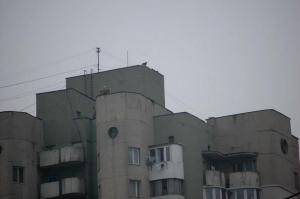
The chapter on Moldova was quite revelatory in its illustrative vignettes which capture those elusive experiences I have found so difficult to articulate. Here, for example, is a brief exchange between Weiner and a hotel clerk which highlights the impenetrable, obstinate ennui that seems to have a stranglehold on the population:
I return to the hotel. My Semi-Luxe room is hot, very hot. I call down to the front desk.
“Where is the air-conditioning?”
“Oh, no sir, there is no air-conditioning in the Semi-Luxe room. Only in the Luxe room.”
“Well, can I upgrade to a Luxe room?”
“No sir, that is not possible.”
“Can I get a fan?”
“No sir, that is not possible. But you are free to bring your own.”
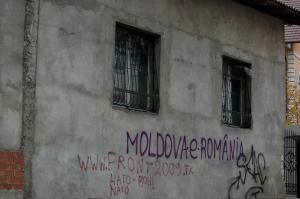
Weiner even visits a group of Peace Corps volunteers, for whom he feels nothing but pity. After all, as he astutely notes, “We can’t very well call it the US Bliss Corps, but that’s what it is: an attempt to remake the world in our own happy image.” And indeed, this is one of the hardest things for me to accommodate to here. My own happiness sparkles a bit before fizzling out in the face of such pervasive doom and gloom. It is difficult to find something – anything – that Moldovans are happy about and you can’t really blame them. When you live in a country corrupted by nepotism, cronyism, and graft; where medical and legal degrees are purchased outright and passing grades are conferred on children of influential parents even when they don’t attend school; where prescriptions are purchased by those who have enough money to bid for a medical appointment in the first place; where only a portion of the international aid flowing in is doled out by the few who have established themselves as trustworthy merely because they speak English; when you live in a country that is a country in name only, but does not appear to generate a cohesive culture that binds people into a group identity that supersedes narrow-minded, short-term pursuits in favor of broad-based, mutually-beneficial reciprocity, you lose. Period.
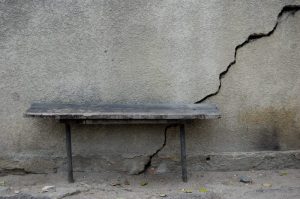
For about the last month, it has become increasingly apparent to my partner that our center is in serious danger of losing its operational revenue after December 31. For reasons I won’t get into here, we have not been successful at finding new sources of funding. My partner has been coming into my office the past few days and sitting in the chair opposite me, her eyes dull and ringed in dark circles, shoulders sagging, hands nervously fidgeting about her face and hair.
“Ce facem, Yvette?” What do we do?
I don’t know. I don’t know. “Nu știu.”
I am not the lucky talisman I was at the beginning. Bit by bit, I feel myself succumbing to the demoralizing ennui. I don’t know how to battle the forces that so relentlessly pound people down here. Of course, as an American and as a Peace Corps Volunteer, I keep taking this failure personally. Why can’t I figure it out? Where is the magic formula that will make this tangled web of lunacy unravel into a logical thread of hope? Why can’t my relentless American optimism overcome this amorphous miasma of despair? I hear myself telling her that she pursue her dream of moving to the United States – escape this country, find a better life for herself and her husband and kids.
And then I stop myself, horrified – what am I saying? My country’s better than your country? How un-PC am I?
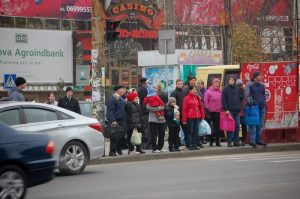
I think I’m ceding to the notion that the line between the outside and the inside is not as sharply defined as we like to think. Although the metaphor of the stalwart individual shaking her fist at the world and turning the tides of fate may be heroic, it does not make room for the millions of people who want to live ordinary, peaceful, predictable, and – yes – mundane lives. Not everyone yearns to be Joan of Ark.
Many western nations naively believe that by “liberating” people and then handing them a toolkit for democracy, we guarantee them future success and happiness. But it’s not that simple. Democracy is predicated on the basis of people trusting in one another, on a shared culture that instills faith in process and creates points of entry into those processes for everyone. Moldovans, 20 years after leaving the Soviet Union, do not have that. At one point in their conversation, Ruut Veenhoven observes to Eric Weiner, “The quality of society is more important than your place in that society.” The truth of those words rings clearer to me each and every day that I live here in Moldova.

I am trying, as best as possible, in all my interactions, to mirror back the innate optimism and belief in democratic process that being a product of American culture has instilled in me. And I have met so many, many Moldovans who want to believe, who yearn for change. But it certainly doesn’t help that many of the best of them are sucked out of the country by the promise of an easier life elsewhere. The changes that need to occur are not going to happen in one person’s lifetime. They must be willing to fight for a legacy that will only be realized by their children, or their children’s children, or their grandchildren’s children.
And how many of us Americans have shown the willingness to do that nowadays?
Meanwhile, happiness comes in small doses, in conversations around the table with Nina, in watching the women work so lovingly with the kids at my center, in sharing a meal with new friends, in solo walks around the lake behind my house. And, I must confess, in getting together with other PCVs, whose vibrant American souls continue to recharge my battery and create new energetic input to my “self.”
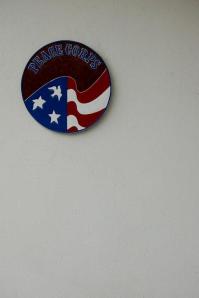
I appreciate my fellow citizens, body and soul, like never before.
Bless you, America and all you Peace Corps Volunteers here in Moldova…be the change you wish to see in the world!
*All photographs are courtesy of fellow PCV Britt Hill – no relation, though I would be happy to claim her. She has a much better eye for detail than I do so I shamelessly stole them from her FB site.
Thanks Britt!!!
these shots are really amazing. they capture so much!
LikeLike
Courtesy of Britt – I will tell her you said so!
LikeLike
I have to say, my experience has been so different than the one that you outline here. I work in a school and we have many conversations and homework essays that deal with Moldovan culture and life, and I hear so many positive things about Moldova. The students I know have so much hope for the changes they want to see in Moldova, maybe it is because they are the first generation that doesn’t have first hand experience with the Soviet era, they have grown up mostly seeing a continuous move towards more development and democracy in Moldova. I don’t often comment on blogs, but reading that you can’t find anything that Moldovans are happy about surprised me so much. I have found quite the opposite in my work here.
LikeLike
I am so glad to hear that Molly. I don’t get the opportunity to interact with any children…the ones in my center are not able to express or verbalize. Though their parents are happy in the moment, when you ask them about the future or the prospects for their children or their hopes for change, they just shrug their shoulders and signal defeat. I have a site mate who is an EE teacher in the schools and she, too, receives most of her satisfaction from her interactions with youth. Maybe I need to go out and find some kids to hang with! And I’ve only been here six months. I know I need to give it time…
LikeLike
Your work situation is so difficult, and I’m sorry things are not improving. After Jan and I read Weiner’s book, we, too, were depressed, like you. However, we, too, tried to find the small happinesses and little successes, and tried to take joy from that chance encounter in the magazin when we chatted with a friendly Moldovan or discussions with family at a masa. I even wrote to Weiner and said that Moldova actually ranks higher now on the Index of Happiness, and things aren’t quite as bleak as he reported in his book. He just responded with a “thanks.” But hang in there. Democracy isn’t perfect nor is it easy, but things ARE improving in Moldova, it just takes a long time. (Of course, my friends have often nicknamed me, Pollyanna!).
LikeLike
I need your wisdom and perspective Leslie – miss you so much!
LikeLike
I love this and am glad to read it: “Hood states that decades of neurological research lends proof to the theory that the “me” inside my head is an ongoing, illusory narrative concocted by the brain to establish a necessary focal point for the reception and organization of stimuli into coherent patterns for reciprocal behavior. He describes an elegant metaphor of the “self” as the external mirroring of one’s cumulative inner experience of the world and the other “selves” we encounter, giving an oddly somatic testimony to the notion that ‘we are all one.’”
I also like that Public Bench photo a lot. That huge crack like lightning, it’s beautiful.
Had no idea there was a WDH. That’s amazing and wonderful in its own way.
Your day-to-day encounters will be what they will but perhaps Einstein can cheer you: “Once you can accept the Universe as matter expanding into nothing that is something, wearing stripes with plaid comes easy.”
My experience tells me looking outside for happiness almost always ends in despair. The light inside is the steady keel, happiness–when it arises–for no reason at all.
Here’s a haiku 4 u:
the worst has happened
a thousand times before, yet
here we are, in love
Let us keep cultivating compassion and empathy even when it doesn’t feel good. Everything is temporary.
My words of ersatz wisdom.
Many blessings.
LikeLike
In other news, the mayor of Zarozje, Serbia has issued a health warning to all citizens in the region: a vampire is on the loose, and all citizens must take steps to protect themselves from the vampire, whose name is Sava Savanovic. I really, really love Eastern Europe. Great post Yvette, great photos as well.
LikeLike
A health warning! Hilarious! What do you think? Is it a media misdirection? p.s. hi.
LikeLike
Oh, I’m sorry, are you friends with that mayor?
LikeLike
I have no comment as to whether I know the mayor or not. I do believe, however, that Sava Savanovic is the greatest freakin’ vampire name of all time.
LikeLike
A case for education, education, education.
http://www.sunherald.com/2012/12/01/4333077/vampire-on-the-loose-in-serbia.html
Actually, can you imagine someone alien to usamerican customs returning home after a trip here and telling their village folk how usamericans bless each other after every sneeze b/c they believe if they don’t the soul will get out or the devil will get in. Maybe Dusan Stojanovic could write an article about that.
I should shut up now.
LikeLike
Cynical me, I think it’s the tourism they’re really after here. And good for them if it’s so. If people will flock to the movies to see bad acting about vampires, why not travel to the source and have a cross cultural experience?
Sent from my iPad
LikeLike
Education about vampires seems to be working in Zarozje, as the article mentions a villager carrying garlic in his pocket.
LikeLike
Culinary comment: we eat garlic raw here – split, peel, and munch! �So far, not a vampire in sight…..
________________________________
LikeLike
Yvette, Interesting post! Coming from a country that consistently scores at the top of the “happiness chart” (Denmark), I have often thought about what components make it so. And what I keep arriving at, as a contributing factor, is the fact that the Danish governmental system is such that it inspires and holds its citizens. It does not belittle them and tear them down. The exact opposite as the system you describe in Moldova; a governmental system of corruption and deceit. And for me, the USA is somewhere in the middle. I am horrified at the mix of money and politics in the USA. Just to mention one thing! Another thought-provoking thing from your post was your comment about how the Moldovans constantly compare themselves to other European nations and find themselves less fortunate. A great point: Our happiness depends on the interpretation of our current situation and is often shaded by our perception of what “should” be or what “could” be, and our ability to affect change. For what it is worth: Your work is important on so many levels. It is not just about affecting immediate change where you are. It is also about affecting change in all of us you reach. It is about letting this experience penetrate your essence so you will carry the knowledge of what life is like in a place that is grey and strange. You are on a hero’s journey of sorts. And all you learn in that foreign place will affect your mind, heart and courage for the rest of your life. And you will thus affect change in all you touch there, and back here – just like Dorothy affected change in all she met in Oz – and then carried the experience with her home. There is no place like home…. and yet the journey is what gives it all perspective.
LikeLike
I agree about this being a hero’s journey. An integral part of that journey is the descent into the abyss, the hardest part of it all, but the richest in terms of the transformation that results. I think they should serve tea and cookies in the abyss!
LikeLike
All of which serves to remind me how fortunate I am to have so many of you accompanying me in spirit along this path (and YOU – soon to be in person, I hope!)
________________________________
LikeLike
I so appreciate your perceptive, intuitive comments Marie! �Thanks for the support and never-ending encouragement…much, much love and gratitude�
________________________________
LikeLike